Summary 
The romantic tragedy is traditionally staged outdoors, set in 16th-century Verona but with a dash of gypsy, the town square teeming with women in scarves and sashes. The production benefits from chemistry between young performers in the title roles as they fall in love at silent first sight, then dance and kiss together in soft pink lighting. A motor-mouth Nurse ingratiates, a highlight among some strong supporting performances that include a hippie Friar Laurence in long gray hair, but best is the presentation of Tybalt. The prince of cats looks menacing but is an affectionate cousin, teasing Juliet and joking with the family, then reduced to anguish after his killing of Mercutio. The conclusion is effectively dramatic, and despite the Friar's lengthy summation, made lean by otherwise judicious edits of the text.
Design
Directed by James DeVita. Costume design by Rachel Anne Healy. Scenic design by Takeshi Kata. Lighting design by Michael A. Peterson. Sound design and original music by Josh Schmidt.
Cast
James Pickering (Escalus), Nate Burger (Mercutio), Matt Schwader (Paris), John Taylor Phillips (Montague), Anne E. Thompson (Lady Montague), Christopher Sheard (Romeo), Jeb Burris (Benvolio), James Ridge (Capulet), Tracy Michelle Arnold (Lady Capulet), Melisa Pereyra (Juliet), Eric Parks (Tybalt), Colleen Madden (Nurse), John Pribyl (Friar Laurence).
Analysis
American Players Theatre (APT) veteran James DeVita directs a traditionally staged version of Romeo and Juliet at the company's Up the Hill outdoor theatre, but injects the 16th-century Verona settings with a dash of gypsy, like the town square teeming with young women in colorful scarves and sashes, wearing rings and wielding baskets of bread. Later, Romeo's 5.1 apothecary is a hissing dark-eyed gypsy-witch in bandana and bangles. His bitter words carry significant weight, as he hands over his payment, especially considering his youth: "I sell thee poison." DeVita sprinkles similarly subtle textures throughout his production: for example, as a color-scheme of the feuding families, the Montagues wear dark brown, the Capulets black, but Romeo and Juliet each usually wear purple and white.
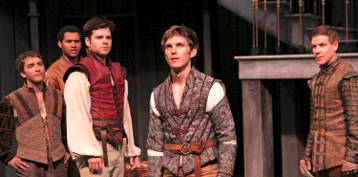
DeVita enhances Romeo's stature as a beloved young man in Verona by surrounding him in early scenes by not just Mercutio and Benvolio but with two other performers as well, so he appears a popular leader of a sizeable group. Christopher Sheard's sandy-haired Romeo meanders to the APT stage after a love struck 1.1 stroll through the woods, visible just stage right. His friends seem almost desperate for his attention - Benvolio teases him with high-pitched calls of "Rosaline!" and after the 2.1 masque they comically try to conjure his presence as if by witchcraft - as well as protective of him, like during 2.4 when they stand and shield him from the suspicious inquiries of the Nurse. Sheard's Romeo reveals a big heart by his concern over Benvolio's injured hand after the opening brawl and by his help of the illiterate Capulet servant, while his worrisome premonitions - "I dreamt a dream tonight" - spark laughter from his friends with the exception Mercutio: "children of an idle brain." As they pull on masks then rush offstage to the costume party, music rises and Sheard's Romeo addresses the audience from downstage - "my mind misgives" - while the stage behind him begins to fill with party-goers.
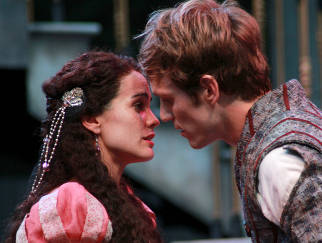
DeVita manages to cull some intriguing chemistry between Sheard and Melisa Pereyra as Juliet. Both actors are young and attractive, very lean and vulnerable, and they click right from their first meeting at the 2.1 masque. Pereyra's lovely Juliet, wearing long, kind of fuzzy-curly dark hair and a wan expression, is guided down the curving stairs from the balcony, accompanied by strums of guitar music. The music ends just as Sheard's Romeo glimpses her, and the love-at-first-sight passion is evoked by sudden silence, almost no one moving on the dance floor except Romeo, who skitters from place to place to get a better and closer look. He interrupts Juliet's dance with Paris to dance with her in soft pink light, and their first kiss is so special it makes both Juliet and Romeo drop their hands with almost comic "oh, awesome!" lifelessness to their sides. Just as endearing is their awkward second kiss, followed by an overheated Juliet - "you kiss by the book" - barely able to speak.
In 2.1, Sheard's Romeo must dodge his friends and sneak back to the stage, and the gestures are both child-like and romantic: Romeo presents himself with such surprise that Juliet panics and covers her bosom, and they espouse boldness but when guards approach to check the upstage center gate, Juliet ducks and Romeo dives for cover. When she summons him, the audience titters at the noise of Sheard's running approach, footsteps pounding from far off, until he finally sprints into the theater and leaps to the stage below Juliet in the balcony. DeVita also opts for subtle gestures, showing the two young lovers making their first sad parting by reaching for each other - her from the balcony, he on tip-toe from the stage - to tenderly touch fingertips. Just as touching is the 2.6 wedding: hand in hand, they begin to exit slowly with appropriate solemnity, then glance at each other and rush off in excited giggles to bring a feel-good intermission. The second act begins with them kissing and parting - to the sound of ominously tolling bells - just prior to the 3.1 brawls in the town square.
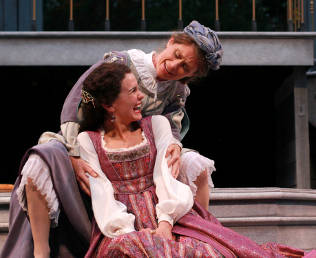
After his banishment, Sheard's Romeo seems immature, refusing to rise from a fetal ball 3.3 until Juliet's name is invoked: "for her sake, rise and stand." His sense of courtesy - "commend me to thy Lady," he implores the Nurse 2.2 - is more plausible than his sudden anger, like when he avenges his friend by slaying Tybalt 3.1, or when he dispatches Paris with an action-movie-hero backward stab to begin 5.3. Pereyra's Juliet is more consistently effective, jumping up and down 2.5 and clapping her hands in girlish anticipation of the Nurse's news. She is equally convincing as a moonstruck girl - "when he shall die, take him and cut him out in little stars" - moved to chest-thumping frustration at her husband's banishment, then to vitriolic venom - "blister'd be thy tongue" - at her lifelong Nurse's betrayal, to ultimately a frightened adolescent, weeping in her Nurse's lap.
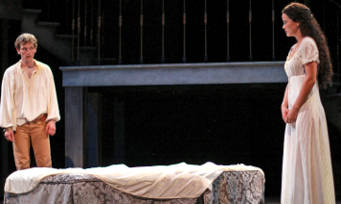
Some of the girlishness fades noticeably in Pereyra's complex performance, replaced with passion - she greets the morning after her wedding night with tears in her eyes, then drops Romeo his shirt from the balcony above - as well as steely resolve. She not only defies her father 3.5, rejecting the marriage to Paris, but her Nurse as well - "ancient damnation!" - because of her turncoat support for the Count. During 4.1, after enduring a kiss from Paris, she pulls a knife and holds it against her throat, the threat similar to Romeo's just moments before, but more purposeful and dangerous. Pereyra's Juliet provides the production's most poignant moments, like her mature acknowledgment of the blood on Romeo's shirt 3.3, or her kneeling in apology to her parents 4.2, ending the good night wishes with her surprisingly insightful "farewell, God knows when we will meet again" that she delivers with ironic eeriness, or just as memorably, overcoming her suspicion of both the Friar's potion and her fear of the family burial crypt with thoughts of her husband: "I drink to thee." Her ensuing coughs and convulsions are disturbing to watch and certainly serve as harbingers for the tragedies yet to come.
Supporting performances are consistently strong, as they are typically within an APT production. Colleen Madden's motor-mouth Nurse lends a welcome splash of humor and color, sitting spread-legged 1.2 with Juliet's hairbrush in hand, dominating the family conversation and punctuating her faint praise of Paris - "nay, he's a...flower" - with a belch. Although characterized as a busy body - DeVita makes a point of Madden's Nurse being the first to rush from the site of the 3.1 brawl, apparently to break the news of Romeo's banishment to Juliet - she seems genuinely shattered by the apparent passing of Juliet 4.5. Her "God forgive me" at a bawdy wedding-night joke becomes panicked rapid breaths as she realizes what has happened, and she screams for help, then cowers in a corner of Juliet's chamber, finally dropping her head to her hand, keening quietly. Friar Laurence is also a colorful soul, a Jerry Garcia-like pot-head in a brown monk's robe, long gray hair, and strapped sandals. Despite his penchant for potions and very bad ideas, he is played as a bit of a rube - "Holy St. Francis!" - wandering in the woods just off stage right, or struggling with the lock on the gate door - "they stumble that run fast" - who abandons Juliet in the crypt at the most inopportune of moments. Still, John Pribyl's Friar projects warmth that is certainly attractive to a young generation, as both Juliet and Romeo turn to him for guidance and support. Romeo goes so far as to kneel before him 3.3, then rises to embrace him before heading off to his wedding night and subsequent banishment.
Juliet's parents are portrayed by expert actors, Lord Capulet a tall and sometimes easy-going gentleman with an explosive temper when contradicted: unoffended by Romeo's presence at his 1.5 family party, he becomes violent at Tybalt's insistence on a fight - "go to; go to" - and knocks him down so roughly the other guests back away uncomfortably. Similarly, he embraces Juliet warmly 3.3, rocking her back and forth as if she were a toddler princess, but when advised of her refusal to marry, he raises a hand against - but not striking - first Juliet, then the Nurse: "peace, you mumbling fool!" At Juliet's apparent passing 4.5, he takes her in his arms and sobs while a wedding-celebration guitar player strums a doleful dirge.
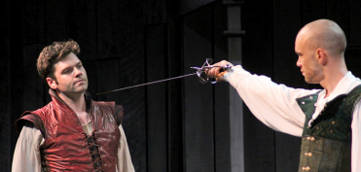
Lady Capulet shows similar chilliness, resplendent in a flowing textured emerald gown with poofs of white at the elbows and shoulders: she turns the difficult Juliet over to the wrath of her father quickly - "tell him so yourself" - and when she cries at the sight of her daughter dead in her bedroom, she slowly walks away, beginning to weep only as she reaches the edge of the stage. And while both Benvolio and Mercutio are well-played amongst Romeo's band of brothers - Mercutio's droll "bon jour" at Romeo's 2.2 return is followed by an accusatory punch - the best supporting performance is Eric Parks's multi-textured Tybalt, a black-leather clad prince of cats with a shaved head and a piercing glare. Parks's Tybalt is also a playful cousin, teasing Juliet with one of the party masks even before he incites some violence in the opening street brawl, the Montagues drawing their swords at the mere sight of him. He also plays the family clown, dressed as a 1.3 servant pre-party, drawing Capulet laughter when he speaks the servant's lines, but later he is somewhat vindictive, swaggering through an aisle within the audience to the stage with a liquor bottle in his hand, and it is he, not the Nurse, who reveals to Juliet that Romeo is a Montague. Even more interesting, he shows honorable reluctance to fight with Mercutio 3.1 even though he is provoked - "here's my fiddlestick!" - and after Mercutio is felled by a knife strike, Parks's Tybalt returns in a rush to the stage, sobbing and genuinely anguished by his actions. He barely puts up a fight against the avenging Romeo and is quickly dispatched with his own dagger.
DeVita concludes this production with an appropriately tear-jerking 5.3, but the scene lacks the zesty detail DeVita has sprinkled across the rest of the play. The ending plays as somewhat by-the-book standard, especially with Pribyl's dazed Friar taking the time to summarize what everyone offstage already knows has happened. DeVita cuts the promises of the fathers to build honorary statues, though Lady Montague is left alive and well, her passing not referred to in this version. It would take a hard heart not to be moved by the idealistic love of the two teenagers, Romeo giving Juliet a final embrace before taking his poison - "thus with a kiss I die" - and lying in a fetal ball beside her. After a noise stops the old-womanish Friar from tugging on Juliet's arm to pull her away, Pereyra's frightened Juliet discovers Romeo and instead of melodramatics, she only begins to tremble, the subtlety of the underplaying quite effective. Her final words to her dagger - "there rust and let me die" - linger throughout the extended closing moments, and the cast basks in an appreciative standing ovation from the APT audience.